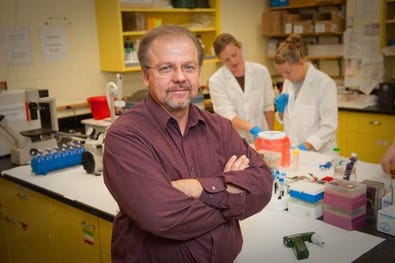Ag research should not be a mere afterthought
December 9, 2015

As the Voice of American Agriculture, Max Armstrong, eloquently said, “Agriculture research should not be an afterthought.” This simple statement has never rung more true as the welcoming news of PRRS-resistant pigs circulated like wildfires this week. You could almost hear the sigh of relief from hog farmers around the world.
For the industry, it is a glimpse of hope that the long war against porcine reproductive and respiratory syndrome virus could soon be over. While it is estimated that PRRSV costs the global hog industry $6 million a day and has killed millions of pigs prematurely, only pig farmers can truthfully articulate the real cost of the disease — the emotional toll.
 The fact PRRSV has chameleon-like characteristics that can rapidly adapt to survive has had researchers resiliently seeking a way to eliminate the disease or at least keep it at a controllable level for years. Still, many researchers frankly admit they never thought they would see the day the dragon would be slayed. As I visited with Raymond “Bob” Rowland, steadfast PRRSV researcher from Kansas State University, about his personal research journey; he openly says “I never thought I would see it in my lifetime.” Rowland says as a researcher he can deeply connect with farmers who lost their livelihood to PRRSV. He discloses, “It is depressing on the farmers but it is also depressing to scientists.”
The fact PRRSV has chameleon-like characteristics that can rapidly adapt to survive has had researchers resiliently seeking a way to eliminate the disease or at least keep it at a controllable level for years. Still, many researchers frankly admit they never thought they would see the day the dragon would be slayed. As I visited with Raymond “Bob” Rowland, steadfast PRRSV researcher from Kansas State University, about his personal research journey; he openly says “I never thought I would see it in my lifetime.” Rowland says as a researcher he can deeply connect with farmers who lost their livelihood to PRRSV. He discloses, “It is depressing on the farmers but it is also depressing to scientists.”
Rowland also vividly recalls the very moment he could officially claim that the team (researchers from the University of Missouri, Kansas State University and Genus plc) had achieved success. After reviewing the results from the challenge tests, Rowland in 30 seconds could see the good news. “There was such a sense of relief that my job is done. I do not have to necessary feel this sense of doom that we will never tackle this disease or we will never find the solution,” he adds.
While there are still countless hours of work to be done before pigs naturally genetically designed to resist PRRSV will actually be seen in hog barns in the Midwest, this great discovery would never happen if agriculture research and development was a mere afterthought.
This particular research story illuminates the importance of “asking why” and the guts to go the distance. Scientists, like farmers and ranchers, devote time and emotions to tackle the big issues. Rowland reminds us that the victories are important but so are the valuable lessons learned along the way.
Research completed today serves as the foundation for future research. “This type of discovery is not only going to be important for making pigs that are resistant but also certainly going to be used to develop better vaccines for our existing pigs. We are beginning to dissect that out — the virus-host interaction in detail. This is really a scientific tool,” Rowland says.
Another vital part to research is fostering future scientists. “If we lose that research infrastructure, we lose a whole generation of scientists that we will never get back,” Rowland stresses. “I normally preach that yes we made a great discovery, but who is going to replace us to make those discoveries in the future.”
Looking over the rich history of America’s agriculture, the advancement and technologies would not be possible without an idea, financial support, collaborative partnerships and a practical sounding board.
“Technology has always been the solution. In history of pork production, new technology has always provided the solution for healthier pigs and for making our market competitive,” he further explains. “The one thing we are losing is research on the government side. We really have to get advocates to push this research agenda.”
You May Also Like



